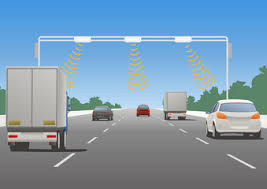In the Part 1 of this article, I introduced Electronic Toll Collection (ETC) System, the countries where it has been deployed and the architecture of a typical ETC system. In the architecture, we have the indoor and outdoor units. The outdoor consists of scanners, cameras, and lasers with the indoor comprising of servers and the entire toll management office. The toll management office has a database with vehicle numbers which are linked to addresses and accounts of it users.
Resistance to Change
For every innovation and change, experience tells us there is a resistance to change. Not to go far, in South Africa, the ETC operators known as Sanral faced several demonstration and resistance from the local people. People campaigned not to have e-tags (OBU) which would mean sabotaging the system. We expect same or more aggression or resistance in Ghana when an ETC system is introduced. As a believer in innovation and change, I expect nothing less. But as actors in the project, government would have to educate the populace and give enough time before it is fully operationalized. As starters, a five (5) year plan to move towards ETC. Before the 5 year timeframe elapses, the populace would have been adequately educated and the ETC system would have been implemented (booth indoor and outdoor systems) and tested on pilot basis.

Opportunity to Strengthen the Addressing System of Ghana
Ghana has been with a non-functional home address system since independence. This is as a result of the lack of planning of our urban and rural areas. Also a major contributing factor is our land tenure system which leaves vast lands in the hand of families and chiefs. These families and chiefs sell these lands when there is no proper plan for these areas. Fast forward, we have the scenario of coming to plan after the damage has already been done. We have an opportunity now with the new Ghana GPS Addressing system. This addressing system has it own flaws, but that is a good point to start. We need to improve on it and inculcate physical locations, lanes and addresses to the GPS system. This is a subject for another discussion.
The new national ID card system is another important national asset that would be needed in the proposed ETC system. A proper ID system would be needed to track down defaulters of the system.



Fig: Sample On Board Units (OBU).
Payment Avenues for Toll Charges
Thanks to Mobile Money payment system, people located in areas with no banks can send and receive money. The avenues for toll charges payment are numerous presently and the toll management system can be integrated to all and taking into consideration all available cyber security measures. Traditional bank deposits, bank transfers, MTN, AirtelTigo, Vodafone, mobile money, VISA, MasterCard, and all other payment platforms can be integrated into the system for easy payment of toll bills. Easy access to payment options would reduce default from road toll users. There should be an automatic interest on bills once the payment period elapses. The payment system can be set for the 15th of every month and interest kicks in after 20th of the same month. A driver who does not pay after a certain period of time can then be a subject for police arrest. A driver who does not settle his bill after the end of the year should not be allowed to renew his road worthiness certificate at the DVLA. The DVLA should have access to all cars who have paid or have defaulted and therefore should be made to pay all areas and interests before they are allowed to renew their road worthiness certificates.
ETC Would Rake In More Revenue
It is a known fact that most motor bikes if not all do not pay road toll presently. With ETC, they would be captured and made to pay if they ply tolled roads. The system has the ability to rake in more revenue compared to the manned toll system. As an added advantage, the ETC system can also help to track down vehicles having fake number plates and stolen vehicles. Vehicles with fake numbers can be identified by the toll management system because the number plates would not match with the addresses and owners or the number plates would not be found in the system. This would be an easy way to alert the police to start tracing such vehicles and clamp them down. Additionally, an ETC system can be used to track stolen cars if and only if they pass through a toll road. This and many more are some of the benefits of ETC which the ordinary toll system cannot provide.
In the last edition of this article, I will be discussing the ability to introduce weight based tolling and the cost and benefit of ETC system. All in all, the opportunities for an ETC system far out ways a human-manned toll system. Ghana cannot lag behind in the technological front. The earlier we advance with the rest of the world, the better.
Author: Samuel Hanson Hagan
(Member: Institute of ICT Professionals, Ghana; Telecommunication Consultant).
Email: shhagan@gmail.com
Mob: +233507393640





